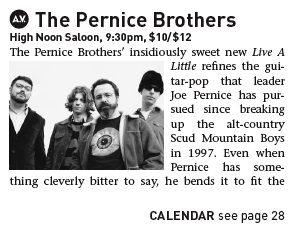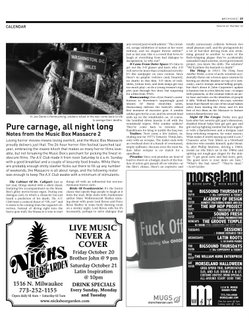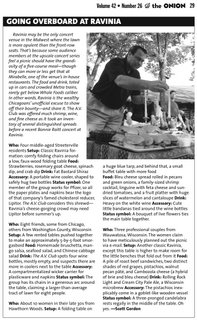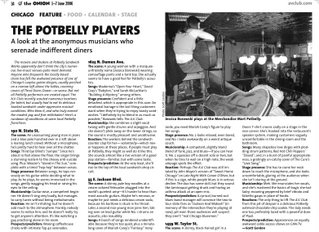Calendar Blurbs(
A.V. Club, Madison print edition)
I write and edit preview blurbs on music, comedy, film events, and sometimes other things, for the Madison edition's local concert calendar. Some are written from scratch and some are updates of previous blurbs. I've included ones that I wrote entirely or almost entirely myself. When anything in these blurbs is from another writers' previous work, I've specified, and at most, that's usually only a final sentence or two that fill in factual information. Click on the images for more legible versions.
Shapes And Sizes, Nov. 30, 2006
 Pernice Brothers
Pernice Brothers, Nov. 9, 2006

 Youngblood Brass Band
Youngblood Brass Band, Sept. 21, 2006
Madison’s Youngblood Brass Band could beat up your favorite ska band and still have plenty of fiery, experimental jazz to spare. Its nine members play together with all the funk and agility of a jazz quartet, incorporating hip-hop rhythms and punkish aggression while they’re at it. Youngblood continues to make respectable commercial progress as well: It’s fresh off a European tour, and this date marks the start of an American tour that will take the band to both coasts. The band’s most recent studio album,
Is That A Riot?, has technically been out since February, but it’s getting a nationwide release next month. YBB’s reputation has a lot more to do with its live shows than with its recordings, but
Is That A Riot? succeeds in capturing some of the band’s live fervor. Opening: El Guante, MC Starr, DJ Pain 1.
Bill Engvall, Sept. 21, 2006
Bill Engvall’s most famous routine, “Here’s Your Sign,” proves you don’t have to be brilliant to rag on stupid people. The bit, which Travis Tritt adapted into a tackily boastful junk-country song, begins with Engvall knocking people for stating the obvious to start conversations, but no worries: If Engvall and his Blue Collar TV buddies Ron White and Larry The Cable Guy have taught us anything about the comedy business, it’s that unshakeable cockiness is much more than half the battle, fancy-dancy incisiveness be damned. And shouldn’t noticing stupidity be the minimum for proving one’s intelligence? It’s kind of a shame, because there are hints of a likeable, funny fellow under Engvall’s gloating-jerk-next-door stage demeanor. But redeeming bits, like his riff on the SkyMall catalogue, always come back to Engvall’s exhausted main theme—how big a loser this or that person is.
Raising Arizona, Sept. 21, 2006 (Image coming)
With the colder months upon us, what could be better than cozying up to this sturdy nugget of Southwestern hick charm? The Coen Brothers’ second feature, which helped them break through commercially in 1987, reminds moviegoers of a more innocent time, when they weren’t so damned ambivalent about Nicolas Cage. He gave arguably the best performance of his career as H.I. McDonough, a desperate but good-hearted career criminal who helps his infertile cop wife (an equally wonderful Holly Hunter) steal a baby from an Arizona furniture baron who’s been blessed with quintuplets. Along the way, they encounter a motorcyclin’ bounty hunter from hell, the drudgery of family life, and that masterfully comedic side of John Goodman (as one of H.I.’s escaped-convict friends) that only the Coens can bring out.
Freedy Johnston, Sept. 7, 2006 (Image coming)
It’s brave of Freedy Johnston to stick with his style. He doesn’t dive under the safe umbrellas of muscular rock or overwrought singer-songwriter dirges, but instead plays unabashedly sweet, melodic folk that somehow distinguishes itself from today’s blander troubadours. Maybe it’s the way he manages to balance his sentimental side with his moody side. Or maybe it’s his voice, which is sincere and graceful without being overbearing. Either way, Johnson’s balanced songcraft has carried him through a recording career that began in 1990. He hasn’t released a studio album since
Right Between The Promises in 2001; his most recent release,
Live At McCabe’s Guitar Shop, captures a 1998 performance.
John Hiatt, Aug. 31, 2006 (Image coming)
On John Hiatt's latest studio album, 2005's
Master of Disaster, the quandary of Hiatt the songwriter is all too apparent. The title track matches Tom Petty's best for prickly wordplay, but plonky ditties like "Wintertime Blues" could make a Parrotthead roll his eyes (or at least bolt for another mai tai). The inconsistency doesn't seem to damage Hiatt the performer. He's musician enough that he can keep any song—yep, even a bad one—engaging with just his own piano or guitar, but mostly he's just straightforward and unassuming. Though his falsetto sometimes fails him (hint: watch out for "Have a Little Faith in Me"), he's solid on old and new songs alike. Hiatt refreshingly refuses to feign coolness--he’s often seen wearing dorky dress shoes with creepy white ankle socks. Besides, who could say no to a face like that? Opener: Paul Thorn.
Godhead, Aug. 31, 2006 (Image coming)
Godhead scrappily self-released three albums before joining Marilyn Manson's record label in 2001 and releasing
2000 Years Of Human Error, a decent LP of Nine Inch Nails- and Cure-influenced screeds. Have they grown? Here's a good indicator:
2000 Years' production masked lead singer Jason Miller's voice in a funky, angry blur; "Trapped In Your Lies," the first single from Godhead’s latest album,
The Shadow Line, pushes the vocals up in the mix and polishes 'em up like so much leftover Scott Stapp, complete with a simplistic, soaring chorus. So it's appropriate that despite his bald-zombie look and outcast lyrics, Miller's been doing a lot of Jesus posturing lately (at least in recent music videos). This is just an acoustic set (see the full band Saturday at Taste Of Madison), but will a humble chain record store be grand and/or wretched enough for the band's increasingly messianic conviction?
Al Rose + Doug Hoekstra, Aug. 31, 2006 (Image coming)
Sometimes it’s pretty much impossible to tell what Al Rose is singing about, which brings en extra layer of interest to songs ranging from the straight-up-country title track of his 2002 LP,
Gravity Of Crow, to the subtly ominous soundscape of “Fish Tale Blues,” from 1999’s
Pigeon’s Throat. (“We're going flower-pot smoking down at 911, / having snail shell sex in a hot dog bun,” he sings on the latter. Do what?) When the lyrics are decipherable, they reveal a wry thinker behind the cleverness. Doug Hoekstra, meanwhile, is a simple oasis in an ever-bloated singer-songwriter desert. His new EP, Six
Songs, showcases what he does best--wistful, narrative lyrics, infectious chord progressions and understated vocals that resort to neither the drowsy whispers or the desperate yelps of lesser singers.
Labels: AV Club, Madison, Music








